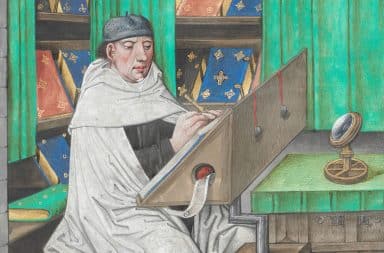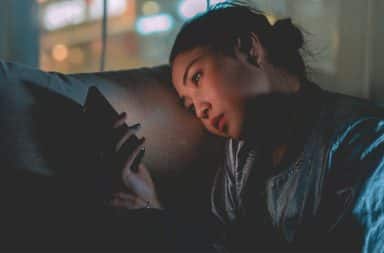Our show is set in the future, which is also 1920s Berlin. Its first season is 25 hour-long episodes; it is based on a two-page short story.
Our hero is a detective, a white man who wears tailored suits and leather coats, which must cost as much as a Tesla, but also acts like he’s broke. Out one night in the futuristic fog, he is drugged by some goons packed into purple jumpsuits. He wakes up with a huge scar on the back of his head and a computer chip in his brain containing the complete personality of legendary jazz musician Charlie Parker. Neither our hero nor Charlie Parker knows how or why this has happened. The Charlie Parker Construct (CPC) has an insatiable lust for saxophones and future heroin, which is called glazz. “I only got two loves: jazz and glazz. And this murder robot ain’t either one,” is the kind of thing the CPC says.
The dialogue is in German, Mandarin, Swedish, French, Spanish, Korean and only occasionally English, both to show a realistic, cosmopolitan future and because our international audience is extremely important.
Also obviously the rich man kills our hero’s love at some point, setting up a dramatic showdown and a sexy, sad orgy containing 45 minutes of full frontal nudity.
Our hero is tormented by visions: his past in the war; a woman in a flowing white gown plunging into a body of water; a child with a dirty face. These are crucial to the show. They are oblique, artistic metaphors that plague our hero and give an insight into his psyche and motivations. Also we only have to shoot them once and we can take up at least five minutes each episode with them.
He is in love with a beautiful woman who’s a prostitute at a craft cocktail bar/brothel, a very common business in the future. Her personality is extremely complicated: she is beautiful, but also sad. She has a few scenes by herself, including a tearful confrontation with a small statue of a fish containing the memories of her dead mother, but she’s naked in all of them so the audience doesn’t get bored.
Our hero is totally devoted to his love. So devoted to her that he doesn’t at all mind that she’s a prostitute. Jealousy is not in his vocabulary. Actually lots of words are not in his vocabulary—“please,” “let me explain,” “let’s talk about this like reasonable adults,” just for starters. He alternates between looking sullen, looking angry, and violently murdering people who only deserve it if you follow an extremely complicated line of reasoning.
The world is rife with inequality, with poor people huddled together in hovels made of human bones and each rich person living inside a golden statue of himself as big a skyscraper. “Imagine how small your dick’s gotta be to want a statue of yourself this big,” CPC jokes, before playing the saxophone for 2 straight episodes.
There is one particular rich man who seems obsessed with our hero—warped and evil, he wants to bend the world to his will. But also his house is really nice, and his wife is extremely hot, so maybe he’s cool? He gives our hero impossible riches, but the things he wants found are terrible and bad. It ties into a vast conspiracy, involving everyone—the president, a beggar, an evil corporation making computer chips containing the personalities of dead jazz musicians, even—gasp!—our hero’s love.
Despite everything, and at great personal cost, our hero uncovers this mystery, because he suddenly has a work ethic for the first time in his life. Also obviously the rich man kills our hero’s love at some point, setting up a dramatic showdown and a sexy, sad orgy containing 45 minutes of full frontal nudity.
And the end of the show, our hero kills the rich man in his giant golden statue. The rich man’s wife doesn’t care, she’s loved our hero the whole time. She has become topless in the fight, somehow, and is too overcome with emotion to get another shirt even though she’s in her own home. As they kiss, she sees that he's been mortally wounded.
Multicolored flames shoot from the crumbling gold tower, as she gives him one last bag of glazz, which he drops on his eyeball and then lights on fire (this is how you do glazz). “Guess it’s time for this birdman to [cough] fly away,” the CPC says. “Yeah, fly,” says our hero. “Who are you talking to?” says the rich’s man’s wife (no one can hear the CPC but our hero).
Everything fades to black, and it seems the show is over. But then the screen is flooded with light. We see old-fashioned cars, men in hats, and doctors on street corners handing out cigarettes. It’s 1950s New York, and as we enter a POV shot, we see our hero hold out his hands—they’re black! Looking in the mirror, we see it’s Charlie Parker’s body. “What in the—hey, I can talk!” says Charlie Parker. “Oh boy,” says our hero, inside Charlie Parker’s head.
This sets up season two, where their positions are reversed, and our hero is aghast at a world of racism and analog pornography. They have to fight racial inequality, manage a successful music career, and maybe save a little girl from something? But the same faces from season one keep popping up. Is this really the past? An alternate dimension? Some kind of VR thing or whatever? Working together, our heroes will figure it out just as soon as the writers do. Probably before the end of season two, but I’m not making any promises.


